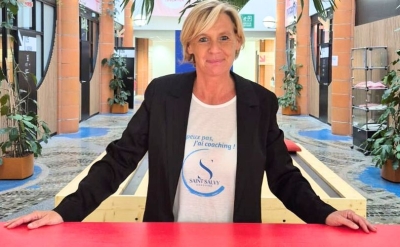News

Our Incredible Life Journeys: Geneviève CAZES-VALETTE (TBS 1977)
Geneviève Cazes-Valette, a professor not like the others. A doctor in Anthropology and Ethnology, specialised in B2C marketing, anthropology of food - more specifically the relationship to meat, an Alumna with a big heart...
Would you say a few words about yourself?
Recently retired from the wonderful job of professor of marketing at TBS, my life has been dedicated to chance and luck. Opportunities have presented themselves; I have seized them with a principle observation: there is always something good to take from it and no point in living with regret.
Why did you choose to go to Toulouse, and TBS, to study?
At first, I wanted to study archaeology - the Aztec civilization. But in June 1973, I was a minor, only 16 and a half, and my father decided otherwise. I found myself taking prep classes in Rodez not really knowing what I was preparing for. A year later I was admitted to Toulouse and Montpellier. One year is enough, no question of career and Toulouse was more accessible by train from my Aveyron, so I went to Toulouse and I don’t have any regrets.
Do you have any stories from your year to share with us ? (student associations, projects, professors…)
1974 to 1977 – three years of very good memories of being a student, at school and elsewhere in Toulouse.
First of all, on the non-academic side. La Cave, the Institution of Toulouse, just under the U restaurant. The only place in the city that turned into a nightclub from 12 to 2 pm and where people had to be turned away at the entrance. I was part of the team in 2nd year, we even went there outside opening hours to dance, from wild rock dancing to waltzes and tango. Or listen to Jean-Luc Guiraud's private jazz concerts and some accomplices. The Dalbade district also, with the Carmelite market, the small bistros (Le Matin and Le Bonaparte) where I spent hours perfecting my tarot and the card game belotte coinchée.
On the academic side, I had no particular enthusiasm for anything except marketing, which I thought was similar to social sciences. But the curriculum was very light at the time, so on the wise advice of Max Cluseau, the Director at the time, I decided to pursue it further in North America. I worked as a freelancer in various marketing research firms for a year to pay for travel and accommodations and then spent a year and a half in Quebec doing an MSc in Marketing.
Who are you today?
What did you have in mind in terms of work after you got your degree? What were your motivations?
I had no motivation to go work for a company and the idea of submitting to a hierarchical system didn’t appeal to me. I was more oriented towards studies and research, and autonomy.
I had the opportunity. One of the school’s professors told me he was going to resign and I could apply for his position. I had returned from Quebec and in January 1980, I was hired part-time as a Marketing Assistant. And, always lucky enough, I got together with other teachers at the school to create a consulting firm, which I ended up working in for ten years before refocusing on my profession as a full-time teacher.
In 1995, I desired intellectual stimulation, so I enrolled in a DEA in Anthropology at EHESS. In March 1996 there was the BSE crisis. This was a chance that put me on the path of my thesis on the relationship between the contemporary French eater and meat.
What are you currently doing?
I’ve been retired since January 2019.
Why did you choose this profession, this project?
I very quickly enjoyed the contact with the students and was able to see them "grow", reveal themselves, find a path, obviously especially if it was in consumer marketing and, even better, in agri-food. But actually no, I was always happy to see them find their way, even if (I knew) it was just to drop out of school and join the army, the orders, or the theatre.
At what moment did you know that this path was made for you?
Very quickly, from my first year of teaching. But I didn't feel legitimate enough without contact with companies, which explains the ten years spent between teaching and studying and consulting. But when it came to choosing between the two, I had no hesitation, it was teaching.
How did you get to where you are today in your career? (The major steps to consider.)
In order to retire, all I needed to was get older. And it happens very quickly when you're not bored at work.
More seriously, I’m currently a professor emeritus and am very proud of it because it means that the school recognises me as having contributed to its influence and I’m still able to do so. I’m still pursuing research on the consumption (or non-consumption) of meat in France. A subject which seemed completely strange when I first became interested in it in 1996 and is now quite fashionable.
How did your studies help you reach your personal and / or professional achievements?
Everything! Because without them I wouldn’t have ever have been able to teach at a business school, let alone the one I did. And whether at a personal or professional level, many of my friends are former classmates and especially former students.
Where do you see yourself in ten years time?
I hope it won’t be in the cemetery.
How are you involved with the Alumni network?
How has the Alumni network been a support to you?
I was always able to rely on the network whenever I was looking for internships and positions for my students, or high-level speakers for professionalisation programmes. But I’ve mainly made a point of maintaining it by staying in touch with my former students. And that they know that it’s not only so that I can "use" them but it’s because I am interested in their professional and personal development.
How would you recommend using it?
I would tell (was just saying) students that their three years of classes are an opportunity to build a network meant for the long term (or to burn themselves with their classmates...). Then I would recommend that everyone, both students and Alumni, to peruse the directory - which is a real mine of information on the types of jobs, companies, countries of residence, etc. Do not hesitate to ask for information from alumni, and not only internship or position leads. And that for all this to of course work, you have to keep your profile updated.
What advice would you give to the Alumni of TBS, whether students or graduates?
Choose something that makes you happy. You spend more time at work than you do with family or friends, so don't choose a job for the salary but for the pride it will bring you every day. That’s what will remain when you retire and think back to what legacy you may have left behind.
Finally, are you willing for Alumni to contact you directly if they are interested in your career path?
Of course. Whether on my background, my advice, or my address book of alumni.















No comment
Log in to post comment. Log in.